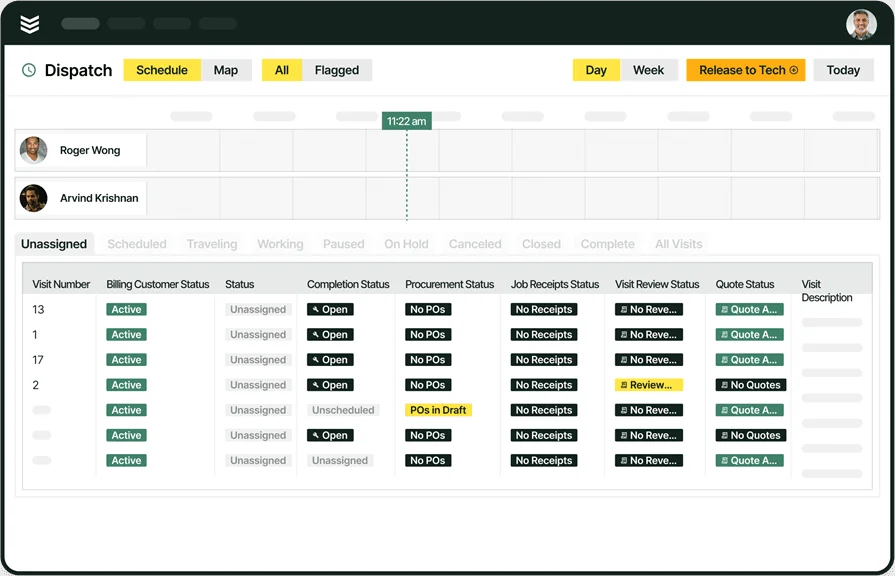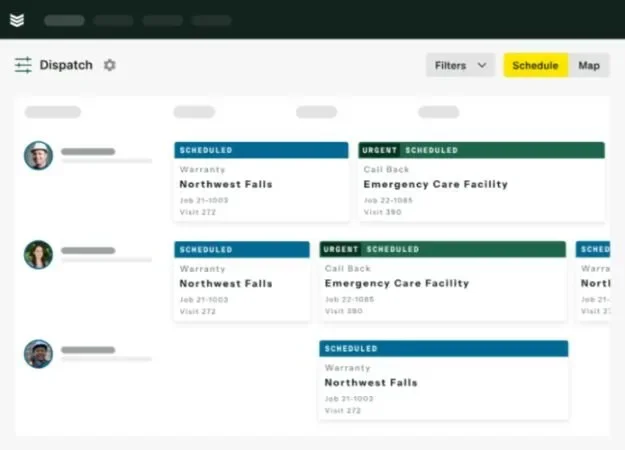If your schedule’s a mess, your whole field service operation suffers. Jobs pile up, techs sit around waiting, and customers start calling in complaints. Whether you’re running HVAC, plumbing, electrical, or refrigeration crews, keeping schedules tight means fewer headaches, less wasted time, and more jobs done right. A solid system keeps your team where they need to be—on-site, on time, and ready to work.
This guide breaks down everything you need to know about field service scheduling, from dialing in your process to choosing the right software. You’ll learn how to keep your team efficient, avoid common scheduling pitfalls, and make sure every job gets the right tech at the right time.
- What is field service scheduling?
- How to implement & iterate your field service scheduling process
- 10 field service scheduling tips & best practices to implement
- Using field service scheduling software
- Top field service scheduling software for commercial and residential contractors
But what exactly is field service scheduling, and why does it matter so much for contractors?
What is field service scheduling?
Field service scheduling ensures the right tech gets to the right job at the right time. It organizes service calls, minimizes delays, and keeps operations running smoothly. Proper implementation of this system prevents double bookings, reduces downtime, and helps techs complete more jobs in a day.
What goes into the field service scheduling process?
Managing a field service schedule takes more than filling up a calendar. It’s about keeping jobs moving, techs productive, and customers satisfied. A solid system helps avoid delays, reduces wasted time, and ensures every job gets the right technician with the right skills. Here’s what you need to consider:
- Job Prioritization – Urgent repairs, planned maintenance, and installation projects all compete for space on the schedule. Knowing which jobs need immediate attention and which can wait helps avoid delays.
- Technician Availability – Not every tech has the same skill set. Assigning the right person for the job—based on experience, location, and workload—prevents mismatched skill levels and unnecessary rescheduling.
- Route Optimization – Wasted drive time eats into the day. Smart scheduling ensures techs take the most efficient routes, reducing fuel costs and maximizing job completions.
- Workload Balancing – Overloading techs leads to burnout. Spreading work evenly keeps performance high and ensures every job gets done without rushing or cutting corners.
- Customer Expectations – Last-minute changes, unclear job details, or no-shows hurt customer relationships. Keeping customers informed and setting realistic expectations improves satisfaction and repeat business.
A good scheduling process brings all these elements together, keeping your team efficient and your customers happy. But it all comes down to the person managing the schedule. A skilled field service scheduler keeps jobs organized, adapts to last-minute changes, and makes sure every tech is set up for success.
What does a successful field service scheduler do?
A top-notch field service scheduler does more than just assign jobs—they keep the entire operation running smoothly. They juggle service requests, dispatch the right techs, and adjust on the fly when jobs run long or emergencies pop up. The best schedulers know how to balance efficiency with flexibility, making sure every tech is utilized without burning them out.
To take scheduling to the next level, they also track job performance, optimize routes to cut down on wasted time, and keep both customers and field techs in the loop. Communication is key—schedulers act as the bridge between the office and the field, ensuring every job runs as planned.
Deep Dive
If you want a deeper look at what separates a good scheduler from a great one, check out this detailed breakdown on field service schedulers.
How to implement & iterate your field service scheduling process
A solid scheduling process helps avoid scheduling conflicts, reduces downtime, and ensures every job gets the right tech at the right time. Whether you’re starting from scratch or improving your current system, following a structured approach makes all the difference.
- Define Scheduling Priorities - Decide what matters most—speed, efficiency, or customer satisfaction. Prioritizing emergency jobs, routine maintenance, and long-term projects helps create a clear scheduling framework that prevents chaos.
- Assign Jobs Based on Skill and Availability - Not all techs are suited for every job. Matching skill sets to job requirements ensure the work gets done right the first time and prevents unnecessary call-backs or delays.
- Optimize Routes for Maximum Efficiency - Minimizing drive time means more completed jobs per day. Use route optimization tools to reduce unnecessary travel and keep techs focused on work instead of the road.
- Leverage Scheduling Software - Manual scheduling only takes you so far. Implementing software designed for field service scheduling automates assignments, prevents double bookings, and keeps your team moving.
- Monitor, Adjust, and Improve - No schedule is perfect from day one. Tracking key metrics like response times, job completion rates, and tech availability helps refine your process over time, making it more efficient with every adjustment.
Expert Tip
A well-structured field service management system sets the foundation, but fine-tuning the details is where real efficiency kicks in. Now, let’s look at specific best practices that can take your field service scheduling to the next level.
10 field service scheduling tips & best practices to implement
A packed service schedule can make or break a field operation. One bad call—double-booking a tech, sending someone across town for a job that could’ve been handled sooner, or failing to prioritize emergencies—can throw off the whole day. Field techs and contractors don’t have time to waste. An all-in-one field service management platform helps them stay efficient, reduce delays, and get every job done right the first time.
1. Prioritize emergency calls without derailing the day
A commercial client calls first thing in the morning—their refrigeration unit just failed, and they need help fast. Meanwhile, the schedule is booked solid with maintenance visits and non-urgent jobs. Without a plan in place, squeezing in this call means shifting multiple appointments, frustrating customers, and overloading techs.
The best way to handle emergencies is to build flexibility into the schedule. Having a system that flags high-priority jobs allows dispatchers to reshuffle lower-priority work without derailing the day. Scheduling software with real-time adjustments makes it easier to move things around without causing chaos.
2. Match techs to the right jobs for faster completion
A tech is sent to troubleshoot a complex electrical panel at a large facility, only to realize halfway through that they don’t have the expertise to handle it. Now, another tech has to be pulled from a different job, setting everything behind schedule. Field service management solutions help prevent these issues by automatically matching jobs to techs with the right skills, certifications, and availability. With real-time scheduling and technician profiles, dispatchers can make informed decisions, ensuring that every job is handled correctly the first time—without unnecessary delays or reassigned calls.
3. Optimize routes to reduce windshield time
A tech wraps up a job on the north side of town, then drives 45 minutes across the city to their next appointment—passing multiple scheduled jobs along the way. By the time they arrive, another tech is stuck waiting on parts, and now everything is behind. Wasted drive time adds up fast. Using software to manage your fleet ensures that jobs are clustered by location, reducing unnecessary travel and allowing techs to complete more calls in a day. A smarter route means less time on the road and more time getting work done.

Explore our scheduling product
Keep contractors ahead of the game with smarter scheduling and job management.
4. Balance the workload to prevent burnout
One of your best techs has been on back-to-back jobs all week—installations, emergency repairs, and last-minute service calls—while others have had gaps in their schedule. By Friday, he’s exhausted, making mistakes, and running behind. Overloading techs leads to burnout, lower-quality work, and delays.
A balanced schedule ensures that jobs are distributed evenly across the team, keeping techs productive without pushing them past their limits. Keeping an eye on workload distribution helps maintain efficiency while preventing costly errors and callbacks.
5. Keep customers updated to reduce no-shows and miscommunication
A homeowner takes time off work for a scheduled service window, only for the tech to show up two hours late due to an unexpected delay. Frustrated, the customer cancels the appointment and leaves a bad review. Late arrivals and poor communication lead to lost business.
Field service CRM software helps manage customer expectations and reduce no-shows and cancellations through features like automated notifications and real-time updates. Keeping clients informed about delays or estimated arrival times builds trust and improves customer satisfaction.
6. Automate recurring jobs to save time
A field tech shows up for a routine HVAC maintenance visit only to find the customer forgot about the appointment and isn’t home. The job has to be rescheduled, wasting valuable time. Automating recurring service appointments with reminders ensures customers are prepared and techs aren’t making wasted trips. A good field service management system can handle this automatically, reducing scheduling gaps and keeping the workflow steady.
7. Keep a digital trail of job history
A refrigeration tech arrives at a site for a follow-up repair but has no record of what was previously done. Instead of getting straight to work, they waste time searching through emails and making calls. A field service mobile app solves this by keeping a digital trail of job history accessible anytime, anywhere. Techs can pull up past service details, notes, and even photos on the go, ensuring they have all the information they need before they even step on-site.
8. Plan for last-minute cancellations and gaps
A commercial plumbing job gets canceled at the last minute, leaving a gap in the schedule. Meanwhile, another customer has been waiting weeks for an available time slot. Having a waitlist system in place allows schedulers to quickly fill open slots, keeping techs productive and customers happy. Field service scheduling software makes it easy to reassign jobs instantly.
9. Integrate inventory management with scheduling
A field tech is dispatched for an electrical panel replacement, but when they arrive, the needed components are out of stock. Now, they have to leave, delaying the job and frustrating the customer. Integrating inventory management with scheduling ensures that techs have the right materials before heading to a job, cutting down on wasted trips and keeping schedules tight.
10. Use real-time tracking for better coordination
A dispatcher gets a call from a tech stuck in unexpected traffic, delaying their next appointment. Without real-time tracking, there’s no way to notify the customer or adjust the schedule. Field service reporting tools with GPS tracking allow dispatchers to monitor tech locations, reroute jobs as needed, and update customers instantly. These reports also help analyze job completion times, travel efficiency, and overall scheduling performance—leading to smarter decisions and a more efficient operation.
Using field service scheduling software
Managing schedules manually might work for a small team, but as operations grow, things get messy fast—double bookings, last-minute cancellations, and wasted drive time all add up. Field service scheduling software takes the guesswork out of managing jobs, ensuring every tech is in the right place at the right time. The right tool streamlines dispatching, optimizes technician workflows and keeps teams running smoothly.
For field service businesses looking for a scheduling solution designed specifically for their needs, there are platforms built to handle the job seamlessly—reducing daily chaos and improving efficiency.
Expert Tip
Learn how the right field service scheduling software can transform how you manage field service operations—boosting productivity by 40% and speeding up payments by 90%. See how BuildOps helps contractors streamline scheduling, cut downtime, and keep jobs on track.
Benefits of using scheduling software for field service management
Keeping track of jobs, assigning techs, and making real-time adjustments can get complicated fast. Manual scheduling leads to double bookings, missed appointments, and too much wasted time. Scheduling software simplifies the process by automating assignments, optimizing routes, and improving communication between the office and the field. Here’s how it helps:
- Eliminates Scheduling Conflicts – No more overlapping appointments or techs showing up to the wrong job. Scheduling software automatically prevents double bookings and ensures availability is updated in real time.
- Optimizes Technician Routes – Instead of wasting hours driving across town, techs get assigned jobs based on location, reducing windshield time and allowing them to complete more calls in a day.
- Improves Response Time for Emergencies – When a critical repair comes in, dispatchers can quickly reshuffle the schedule and assign the closest available tech, reducing downtime for customers and preventing revenue loss.
- Enhances Communication Between Office and Field – Techs receive instant updates, job details, and customer information through a mobile app, keeping them informed and ready before they even arrive on-site.
- Tracks Performance and Job Metrics – Scheduling software collects data on job completion times, response rates, and technician productivity, helping businesses identify bottlenecks and improve overall efficiency.
A good scheduling system keeps the entire operation running smoothly, reducing delays and maximizing productivity. Next, let’s break down the key features to look for when choosing the right field service scheduling software.
7 field service scheduling features to look for
Not all scheduling software is built for field service teams. The right system does more than just assign jobs—it streamlines dispatching, minimizes delays, and keeps techs moving efficiently. Whether you’re managing last-minute emergency calls or balancing routine maintenance, these essential features help keep your operation running smoothly. Explore more features of field service software designed for field techs.
- Real-Time Scheduling & Dispatching - Schedules change fast—jobs run long, customers reschedule, and new service calls come in. Real-time scheduling allows dispatchers to adjust assignments instantly, ensuring techs are always sent to the right place without disrupting the entire day’s workflow.
- Automated Job Assignments Based on Availability & Skills - Sending the wrong tech to a job wastes time and frustrates customers. A system that automatically assigns jobs based on availability, skill set, and location ensures that every technician is matched with the right work, reducing callbacks and delays.
- GPS & Route Optimization - Too much time on the road means fewer completed jobs. Scheduling software with built-in GPS tracking and route optimization helps techs take the most efficient paths, cutting down on unnecessary drive time and fuel costs.
- Customer Notifications & Appointment Reminders - Missed appointments and no-shows throw off the schedule. Automated customer notifications—confirmations, appointment reminders, and real-time ETA updates—help set clear expectations and keep jobs on track.
- Drag-and-Drop Schedule Adjustments - Last-minute changes are inevitable. A simple drag-and-drop scheduling tool allows dispatchers to quickly move jobs around, reassign techs, and adjust routes without breaking the entire schedule.
- Integrated Job & Work Order History - Techs need access to past job details to avoid duplicate work or unnecessary troubleshooting. A scheduling system that connects directly to service history gives them instant access to past notes, parts used, and job outcomes—right from their mobile device.
- Multi-Day & Recurring Scheduling for Maintenance Contracts - Long-term maintenance contracts and multi-day projects require more than basic scheduling. A system that supports recurring service visits ensures that contract work, seasonal tune-ups, and multi-phase installations are planned out in advance without manual tracking.
A well-built scheduling platform keeps jobs flowing, minimizes disruptions, and helps techs make the most of their time in the field. Next, let’s take a look at the top scheduling software options designed specifically for field service contractors.
Top field service scheduling software for commercial and residential contractors
Choosing the right scheduling software can be a game-changer for field service businesses. The best tools help streamline dispatching, reduce scheduling conflicts, and improve job tracking—all while keeping operations running efficiently. But not every platform is built the same. Below, we break down the top options, starting with the best solution for commercial contractors.
1. Best for commercial: BuildOps
BuildOps is designed specifically for commercial field service businesses, offering advanced scheduling tools that help contractors manage high-volume jobs, recurring maintenance, and complex service requests. The platform provides real-time scheduling, intelligent job assignments, and seamless communication between the office and field techs. It also integrates with work order management and customer history, ensuring that every service call is handled with full context.
Why This is Best for Commercial: Commercial contractors deal with multi-site service agreements, recurring work, and large crews. BuildOps simplifies complex scheduling with a drag-and-drop interface, automated job assignments, and real-time tracking—keeping operations efficient at any scale.
See how BuildOps scheduling software keeps commercial contractors ahead of the game with smarter scheduling and seamless job management.

Auto-optimize your schedules
Learn how BuildOps Smart Scheduling takes the manual work out of dispatching.
2. Best for residential: Housecall Pro
Image Source: Housecall Pro
Housecall Pro is a strong choice for residential field service businesses, offering an easy-to-use interface for scheduling, dispatching, and customer management. It simplifies job scheduling with drag-and-drop functionality and automated reminders, helping contractors reduce no-shows and last-minute cancellations. The platform also includes invoicing and payment processing, making it a solid all-in-one tool for small to mid-sized residential service businesses.
Why This Is Best for Residential: Residential contractors need scheduling software that keeps things simple and efficient. Housecall Pro makes it easy to manage one-off service calls, recurring maintenance, and customer communications—all in one place. However, for contractors handling more complex commercial work, a more specialized platform may be a better fit.
Explore Housecall Pro’s scheduling solutions designed for field service teams.
3. Best for general contractors: Jobber
Image Source: Jobber
Jobber is built for general contractors handling a mix of job types, from installations to maintenance. Its scheduling system allows businesses to assign jobs, track progress, and adjust schedules on the fly. With built-in client management and quoting tools, Jobber helps contractors keep projects organized and reduces scheduling conflicts.
Why This Is Best for General Contractors: General contractors need flexibility, and Jobber offers scheduling tools that adapt to changing job demands. It’s great for managing multiple projects at once, though those in the commercial space may need a platform with deeper service management capabilities.
Discover Jobber’s scheduling software designed for growing service businesses.

Get the Marketing Tools field guide
Identify which tools are necessary to improve your scheduling operations and book more jobs.
Field service scheduling can make or break your operation. The right software keeps jobs flowing, minimizes downtime, and helps your team stay productive. While many platforms offer basic scheduling, few combine real-time dispatching, skill-based job assignments, route optimization, and full-service history in one place. That’s where BuildOps stands out.
Most scheduling tools force you to compromise—lacking key features or requiring multiple add-ons to get the job done. BuildOps is built specifically for commercial contractors, packing every essential scheduling tool into one seamless platform. From automated job assignments to integrated field reporting, it’s everything you need to keep your operation running smoothly.

See BuildOps in action
Streamline scheduling for more bookings and better project management.







